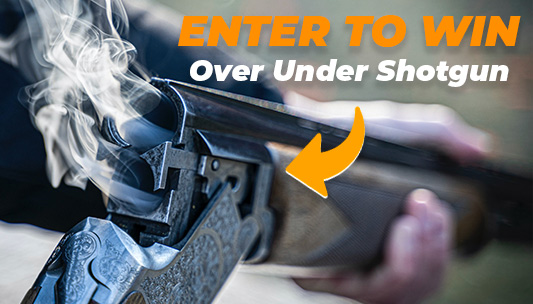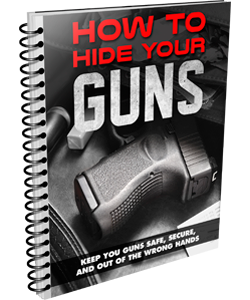Open season is just a few weeks away for most of the United States. It's an exciting time of year for veteran hunters and beginners alike. But before heading out on your first hunt, make sure you're familiar with Alaska hunting laws.
Alaska Hunting Laws and Regulations
– This article was originally posted at OutdoorWarrior.com and is shared with full permission –
Hunting laws evolve on an almost yearly basis, mainly to address public safety for the benefit of the hunter and the hunted. It's a must to keep up to date on Alaska hunting laws before heading out on your first hunt.
Studying your state's hunting laws might be a bit time-consuming, and we know you're impatient to get out there and start shooting. But breaking the law and having to pay a fine can put a serious damper on hunting season.
Keep reading to learn about Alaska hunting laws, including dates, which animals you’re allowed to hunt, which weapon you're allowed to use, how to get a hunting license, and much more.
Alaska is one of the most popular hunting destinations because it's home to a variety of big game, making it an exciting place for hunters. Hunting season begins in the months of August and September and usually ends by October.
According to records of a hunter-conservationist organization in the U.S., the most common animals being hunted in Alaska are brown bears, moose, and caribou.
Brown Bear & Grizzly Bear Hunting in Alaska
Alaska is said to be a bear country. It's not uncommon to come across black bears, brown bears, and even polar bears in the state.
The brown bear and the grizzly bear are of the same species (Ursus arctos) by classification.

image via Wikinuts
The species can be found all over the state except for the following areas:
- Islands south of Frederick Sound in southeastern Alaska
- Islands west of Unimak in the Aleutian Chain
- The Islands of the Bering Sea
General Hunting Season

Image via Shoshone Wilderness
For Southeast Mainland: between September 15 – December 31 and March 15 – May 31.
Legal Weapons and Ammo
- Muzzleloader, that is a shoulder mounted long gun with a barrel that is rifled or smooth bore. Use a .45 caliber or larger and discharges a single projectile.

Image via Wide Open Spaces
- Bow and Arrow that at least has 50 pounds draw weight. It should have an arrow over 20” in overall length.
- Crossbow with a 100-pound peak draw and has a bolt with at least 16” overall length. The broadhead shouldn’t be barbed and can either be fixed, mechanical /retractable and replaceable blade type.
To learn more about what weapons and ammo are allowed by the state of Alaska, click here.
Hunting Moose in Alaska
These heavy-bodied and long-legged creatures are the largest members of the deer family. Bull moose are the only ones that have antlers with the trophy class bulls being found in the western portion of Alaska.

Image via Alaska Photographics
It is vital that a hunter is able to identify a legal moose for hunting in accordance to the regulations by the state.
Hunting Seasons
- For Resident Moose Hunters: August 24 – 28 and September 8 – 17
- For Non-Resident Moose Hunters: September 8 – 17

Image via Wild Alaska Hunting
- The hunt for antlerless moose by permit/hunt # DM413 is November 1 – December 25
- Some late winter moose hunts are open as well as availability of Tier II and Drawing permit materials. Click here for more details.
For more details about Alaska moose hunting laws, click here.
Legal Weapons and Ammo
Generally, hunters are allowed to hunt using a shotgun, muzzleloader, and bow and arrow by permit only depending on the area they are hunting in.

For more details on firearms and ammunition, click here.
Hunting Caribou in Alaska
Caribou, like the moose, are larger members of the deer family. Both sexes of caribou grow antlers, which is a distinction that sets them apart from their cousins. Since caribou migrate on a seasonal basis, timing is of the essence.

Image via Shutterstock
A certain area that may be a good place to hunt for caribou in August may not have the same number in September. According to data, an average of 22,000 caribou are hunted in Alaska each year.
For more details, click here.
Hunting Seasons
General hunting season is August 10 – September 20. By permit is December 1 to March 15.

Image via In The Field
There is also year-round hunting, depending on the area. For other detailed season dates and their respective areas for hunting caribou, click here.
Legal Weapons and Ammo
- Rimfire firearm using .22 caliber cartridges to take out swimming caribou in Units 23 and 26.
- Bow and arrow with 40 pounds peak draw weight with an arrow that is at least 20 inches in overall length. Broadhead is fixed and not barbed.

Image via Grand View Outdoors
- Muzzleloader that is shoulder-mounted long gun with a .45 caliber or larger ammo. Barrel is either smooth bore or rifled and discharges a single projectile.
For more specific details for what type of firearms and ammo you can use and turn to pages 18 – 20.
General Hunting & Trapping License and Permits
This is for all the above-mentioned game. It is imperative that one must acquire the appropriate license and whichever permits, harvest tickets and tags for particular hunts.
Just click here to learn more about the proper license and permits, including the acquiring and purchasing licenses, licensing options and the available possibilities for the disabled elderly and military personnel.

Image via Gizmodo
There is a lot more to learn when going hunting than how to aim and shoot. If you want to become a responsible citizen, it will take a lot more time, resources and effort before you can go out and hunt. But when the time comes that you do get all the necessary requirements and proper training, you’ll never regret taking the time to do so.
Get the Hoffman Richter Fixed Blade from our Amazon Store. Use NCSAVE10 to get a discount.

Follow us on Facebook, Instagram, Twitter, and Pinterest!
Disclaimer: All content on this site is for informational purposes only. Please read our full disclaimer here.
Editor's Note: This article was originally published on December 22, 2022, and has been updated for quality and relevancy.




